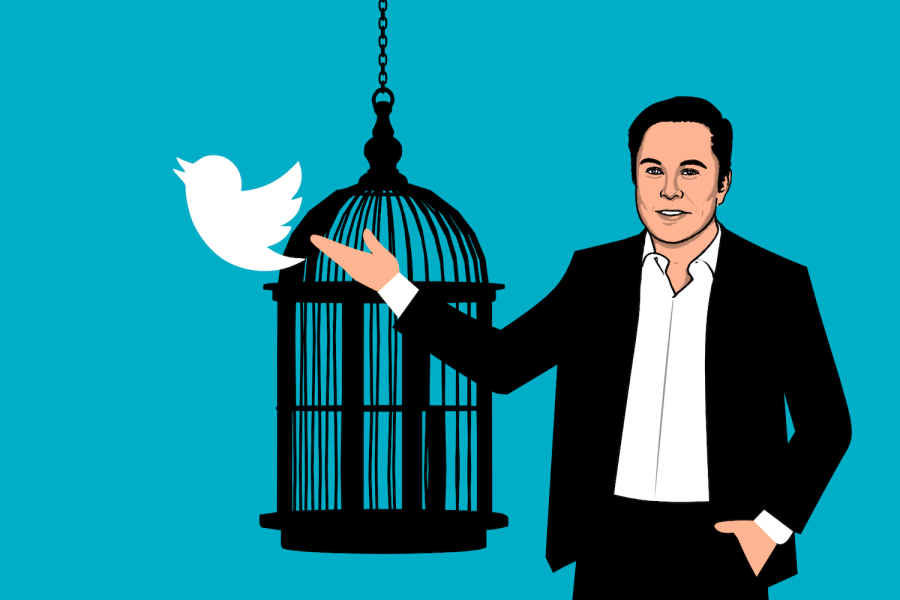Elon Musk sent out a declaration that rang out above every Twitter thread Oct. 28: “The bird is freed,” signifying his official $44 billion takeover of the social media app.
Weeks in advance, Musk championed his takeover of Twitter as a triumph of free speech. However, instead of restoring balance like many had anticipated with his ownership, in these last three months, Musk’s ownership has brought only chaos. Musk’s introduction of the widely unpopular subscription service Twitter Blue, enabling trolls to cause billions of dollars of damage to major companies, and hardline attitude towards staff norms have put the company in jeopardy.
“Twitter Blue”
Despite his initial claims, it became clear that Musk’s priority was drastically restructuring Twitter’s business model. In his first week, Musk laid off half of the existing staff, primarily in the machine learning and content moderation departments, two departments critical to maintaining the usability of the app. He also dismissed a greater majority of Twitter’s contractors and advertisers in a dramatic shift away from the app’s main source of revenue, according to the New York Times.
This was the first poor decision of many. By removing so many employees at once, Musk rendered Twitter exceptionally vulnerable to usability issues, which quickly became clear when he introduced his ambitious new subscription service “Twitter Blue.”
“Twitter Blue” is the first sponsorship service in the platform’s history and allows any user to receive a coveted “blue check” for a price of $8 per month.
In a since-deleted tweet, Musk claimed that the new service was not only affordable but would finally put an end to Twitter’s major trolling problem by forcing all impersonating accounts to the bottom of users’ feeds. However, in reality, Musk has just monetized free speech. In order for a user to have their voice heard on the app, they need to pay him first.
However, a major problem became apparent when users bought a blue check and impersonated major companies or public figures. The very trolling that the blue check system aimed to eliminate was only exacerbated.
However, in reality, Musk has just monetized free speech.
A now-banned account called “LockheedMartini” had bought a blue check and falsely announced that the aerospace engineering company Lockheed Martin would halt all sales to Saudi Arabia, Israel and the United States until their human rights abuses were investigated. Lockheed Martin shares proceeded to drop by over 5%, equating to billions in dollars of losses for the company, per Google Finance.
Another account impersonating pharmaceutical company Eli Lilly announced that the company was excited “to announce that insulin is free now.” This created an even larger dip in Eli Lilly’s stock price, according to the Washington Post.
The immense controversy over the blue check system has completely derailed Musk’s economic model, and around November, his desperation increased. “Without significant subscription revenue, there is a good chance Twitter will not survive the upcoming economic downturn,” he wrote in a staff-wide email in early November, according to Forbes.
Musk originally planned for “Twitter Blue” to be one of the platform’s primary sources of revenue. However, due to the service’s immense unpopularity, it seems unlikely that its botched introduction will allow the company to make sufficient profit before needing to pay massive interest payments that may put Twitter too far in the red to recover.
Employees flee
Amid the turmoil, Twitter staff began leaving the company in droves. Multiple top executives have resigned from the company, including the Chief Information Security Officer and the Chief Compliance Officer.
On their way out, an unnamed employee sent out one last staff-wide message: “Elon has shown he has only cared about the losses he’s incurring as a result of failing to get out of his binding obligation to buy Twitter. This will put a huge amount of personal, professional, and legal risk onto engineers. I anticipate that all of you will be pressured by management into pushing changes that will likely lead to major incidents,” according to the New York Times.
Again, Musk’s rash actions have continued to put the tech giant in jeopardy. The number of employees has already been reduced to the complete minimum, meaning Twitter cannot afford this additional exodus of employees in the long term, especially considering two major challenges it already faces.
The first is an impending compliance order with the Federal Trade Commission. With the exit of the Chief Compliance Officer only a day before its due, pressure has only been intensified.
For the employees still standing, their workloads have risen to disproportionate amounts. However, Musk seems to believe that the solution is simply to make the staff more “hardcore,” rather than bring in new employees.
From now, the expectation of Twitter employees is that they will work longer shifts and even sleep in the office. Musk has even gone so far as to outfit some headquarters with beds for employees to sleep in, according to Forbes.
While this has seemed to keep the company operational in the short term, Musk’s decisions seem impulsive rather than rational. Without a certain number of employees to share a reasonable workload, it is only a matter of time before employee error and fatigue could create major problems.
While this has seemed to keep the company operational in the short term, Musk’s decisions seem impulsive rather than rational.
Free speech or Musk’s sandbox?
Musk has also recently come under scrutiny for not adhering to the principles he laid out in his initial takeover of Twitter. Despite taking rather slow action to combat impersonators damaging other corporations, Musk wasted no time banning accounts that were pretending to speak for him.
After political commentator h3h3Productions subscribed to “Twitter Blue” and switched all his handles to that of Musk’s, he was permanently banned from the app. Musk then posted his own tweet declaring “any Twitter handles engaging in impersonation without clearly specifying parody will be permanently suspended.”
This outraged many users who called Musk out on a previous tweet calling to “legalize comedy.” It appeared that Musk was perfectly fine with impersonators so long as they were not making fun of his own likeness.
Twitter poll
After weeks of putting out fire after fire, Musk’s exhaustion became apparent when he released a poll on his Twitter accounts asking users if he should remain as Twitter’s CEO. The poll asked, “Should I step down as CEO of twitter? I will abide by the results of this poll.”
Votes for “yes” to remove Musk from his position edged out users who voted no by a mere margin of 7.5%.
At first, Musk appeared to once again ignore his critics and take action into his own hands, agreeing with Twitter users’ claims that results were skewed due to “deep-state-sponsored” bot users.
He even went as far as to declare that from now on, all of Twitter’s policy changes would only be decided by Twitter blue users.
However, in regard to the poll deciding whether his tenure as CEO should continue, it appears that Musk has abided by the results. He declared that he will immediately step down as Twitter’s Chief Executive Officer as soon as he finds someone “foolish enough to take the job,” according to the BBC.
Future
Twitter has yet to pay just under $13 billion to multiple banks that aided in Musk’s initial acquisition of the company. Despite revenue having dropped a total of 60% since Musk’s initial takeover, the company made its first payment of $300 million, per Reuters. However, Musk’s impulsive actions that have barely kept the company afloat these last few months may finally weigh it down too much in the long term.
Whether it be an increasingly exhausted and inefficient workforce, a series of fines from the FTC or even bankruptcy, there are multiple factors that are all likely to be the cause for Musk’s downfall.
The only thing Musk can do now is re-evaluate his approach. Perhaps if he makes decisions that consider the survival of the company rather than allow it only to make ends meet, he may be able to salvage the situation. Regardless, no matter what Musk does from now on, there is no doubt he will leave this situation with at least a very damaged reputation.






